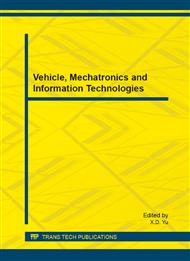p.3204
p.3209
p.3213
p.3217
p.3222
p.3226
p.3230
p.3235
p.3239
Nonlinear Compensation for Resistive Displacement Sensor
Abstract:
For the nonlinearity of sensors always reduces the accuracy of control and detection system in engineering, a new compensation method based on MCU is put forward in this paper. To verify the feasibility of this method, a data acquisition system and compensation system are designed. The polynomial fitting is applied to obtain the functional relationship between input and output. Then the compensation system is tested on the resistive displacement sensor. The results show that after the compensation, the sensor error can be reduced to less than 1% and this method is identified to be practical.
Info:
Periodical:
Pages:
3222-3225
Citation:
Online since:
August 2013
Authors:
Price:
Сopyright:
© 2013 Trans Tech Publications Ltd. All Rights Reserved
Share:
Citation:


